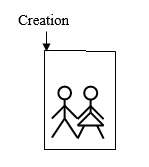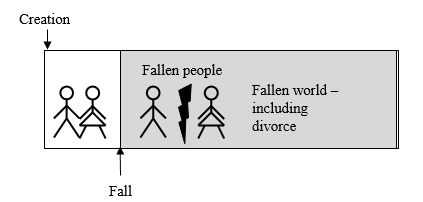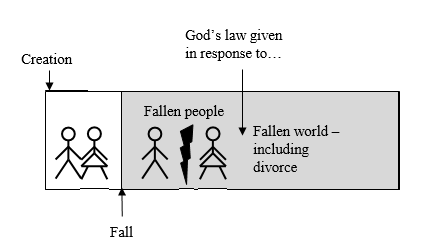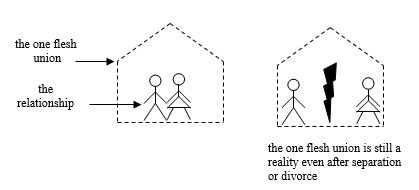Resources
16 July 2023
6:30pm
Jesus' teaching on divorce
This is the third of a series of four called: Jesus on men and women. We’re unpacking Jesus’ fullest piece of teaching on this area of our lives. And, as we’ve seen, although it was prompted by a question about divorce, it’s about much more. And even tonight, as we come to Jesus’ teaching on divorce, we’ll see that, above all, it’s still about the nature of marriage. So let’s pray before we go on:
Father, Thank you for these words which your Son spoke when he was here on earth. Please speak through them to each one of us in our different needs, and help us to recognise in them your wisdom and goodness. In Jesus’ name, Amen
So please have the Bibles open at page 824, and let me read again the question that prompted Jesus’ teaching (Matthew 19.3):
And Pharisees came up to [Jesus] and tested him by asking, “Is it lawful to divorce one's wife for any cause?”
And they thought that a man could divorce his wife simply because he felt like it, and that he then had the right to re-marry. In other words, they said: The Pharisees: ‘A marriage is for as long as you want it – after which you can move on to another’. To which, as we saw last week, Jesus said: ‘You haven’t understood what marriage is. Because, Jesus: ‘A marriage is a life-long, one flesh union between a man and a woman, ultimately created by God’. So Jesus then answered their question at the end of Matthew 19.6:
What therefore God has joined together, let not man separate.
In other words, God’s will for us, if we marry, is to recognise that he’s put us into a life-long one flesh union, and to live out our relationship within that secure structure for the rest of our lives. In other words, divorce is not God’s will – it’s never what he desires. But these Pharisees thought it was because of the one divorce law in the Old Testament. So, Matthew 19.7:
They said to him, “Why then did Moses command one to give a certificate of divorce and to send her away?”
So just look at that one Old Testament divorce law, on screen (Deuteronomy 24.1-3):
When a man takes a wife and marries her, if then she finds no favour in his eyes because he has found some indecency in her, and he writes her a certificate of divorce and puts it in her hand and sends her out of his house, and she departs out of his house, and if she goes and becomes another man's wife, and the latter man hates her and writes her a certificate of divorce and puts it in her hand and sends her out of his house, or if the latter man dies, who took her to be his wife, then [and this is the only command... then] her former husband, who sent her away, may not take her again to be his wife…
So divorce isn’t permitted there, still less ‘commanded’ as they said. It’s simply assumed as a sad reality in a fallen world. It’s simply assumed that sinful men will leave their wives, and invent the idea of a certificate of divorce which they think ends the marriage and sets them free to marry again. But, Matthew 19.8:
[Jesus] said to them, “Because of your hardness of heart Moses allowed you to divorce your wives [which doesn’t mean that law permitted divorce; but that it accepted that it was a sad reality in a fallen world which needed law to limit the damage it did], but [says Jesus] from the beginning it was not so.
So look at this first picture:

We’ve seen how Jesus said, ‘If you want to understand yourselves as men and women, and understand God’s will for sexual relationships, you need to go back to the beginning, to creation.’ But next picture:

We’ve seen how Jesus also said ‘You need to understand that you’re fallen people (which includes having desires we shouldn’t act on) and that this is a fallen world – which includes things like divorce, which were never part of God’s creation design. And next picture:

Jesus is saying that God’s law was given in response to that fallen situation,
to limit the damage of it. And when it comes to that divorce law, it was given to protect the woman. And then comes this word from Jesus which we need to work to understand. Matthew 19.9:
And I say to you…
And that’s like those moments in the Sermon on the Mount, where Jesus says ‘You have heard something said, supposedly based on my Father’s Old Testament law. But I say to you…’ And God the Son then makes an authoritative declaration of his Father’s will. And that’s what’s happening here. Matthew 19.9:
And I say to you: whoever divorces his wife, except for sexual immorality, and marries another, commits adultery.
Now the first issue here is what the word translated sexual immorality means. It’s = the Greek word ‘porneia’, which covered all kinds of sexual activity outside God’s will. For example ‘porneia’ could mean all sexual activity outside marriage, by single people – whether hetero- or homo-sexual activity.But it can’t mean that here, because Matthew 19.9 is about married people. So next, ‘porneia’ could mean sexual unfaithfulness in betrothal. That, in Matthew 1, is what Joseph assumed of Mary on discovering she was pregnant. And in those days, engagement (or betrothal) was regarded virtually as marriage – although it wasn’t, because marriage requires sexual consummation. But if you found your fiancée had been sexually unfaithful, the expectation was that you would divorce. It was called that, though actually you weren’t married yet, so you were separating, ending a betrothal. So maybe Jesus had that scenario in mind. Matthew 19.9:
And I say to you: whoever divorces his wife, [open brackets: an exception to this is sexual unfaithfulness in betrothal. You may end a betrothal for that – because betrothal isn’t marriage].
And someone who ended a betrothal for sexual unfaithfulness would be free to marry in future – so Jesus wouldn’t want them applying Matthew 19.9 to themselves. But next, ‘porneia’ could mean marriage within the forbidden degrees. So there are Old Testament laws that say: you mustn’t marry a close relative – and if you do, God doesn’t recognise it as a real marriage, and you should separate. So maybe Jesus had that scenario in mind. Matthew 19.9:
And I say to you: whoever divorces his wife, [open brackets: another exception to this is marriage within the forbidden degrees. If that’s your situation, you should separate because your relationship was never a marriage in the first place].
So Jesus doesn’t want someone married within the forbidden degrees to apply Matthew 19.9 to themselves and say ‘I mustn’t separate’, when they should separate. But there’s no clue in the context to narrow it down to either of those scenarios. So in his wisdom, Jesus may have used ‘porneia’ to include those scenarios, as well as the scenario of an adulterous wife or husband. So I take it that in Matthew 19.9, there is another exception Jesus wants to make – this time, the scenario of adultery. But before trying to work out exactly what that exception is, look back to the original question in Matthew 19.3:
Is it lawful to divorce one's wife for any cause?
So the Matthew 19.3 scenario is people thinking they can end a marriage and go on to another one just because they feel like it. So, sexual unfaithfulness in betrothal is not involved; marriage within the forbidden degrees is not involved; and adultery is not involved. And so Jesus’ exception in Matthew 19.9 does not apply to the people asking the question in Matthew 19.3 – so for them, we can cross it out. So now look at Matthew 19.9 with the exception crossed out. To people thinking they can end a marriage and go on to another one just because they feel like it, Jesus says:
...whoever divorces his wife…and marries another, commits adultery.
So these Pharisees thought you could end a marriage by divorce and so be set free to marry again. But Jesus says: no, marriage is a life-long, one flesh union between a man and a woman, ultimately created by God. And he teaches that it can’t be ended by divorce, and that it isn’t ended by adultery, either.

And so the one flesh union (this invisible creation reality) continues even if the couple are separated in their own eyes, or even if the couple are legally divorced in society’s eyes. And that’s why Jesus says; if someone divorces and remarries, it’s an adulterous step; because the one flesh union of the first marriage is still a reality.
So where have we got to? I’m saying that Jesus teaches that divorce is not God’s will, and that remarriage after divorce is not God’s will, either. So is there any exception to that in the scenario of adultery? I’m persuaded the answer is no. Let me explain why. We need to remember the question (or rather the person) Jesus is answering. He’s answering the man in Matthew 19.3 who plans to initiate divorce because he feels like it, so that he can leave his wife and marry again. And to that man, Jesus says Matthew 19.9 with the exception crossed out:
I say to you: whoever divorces his wife…and marries another, commits adultery.
In other words ‘If you do that, you’ll be responsible for causing divorce and you’ll be committing adultery. And you’ll be culpable before God. But in Jesus’ exception in Matthew 19.9, I think Jesus is acknowledging not just the scenarios of unfaithfulness in betrothal and of the forbidden degrees. He is also acknowledging the scenario of adultery. In Matthew 19.9 he uses the scenario of a husband whose wife is being sexually immoral, but the same would go for a wife whose husband is being sexually immoral. So in Matthew 19.9, the wife is committing adultery and wanting out of the relationship. And however much the husband might wish to save the marriage, if she persists, she can make that impossible. And we also need to realise that, in Jesus’ day, both Jewish and Roman society would have said to that husband: you must divorce her. There was social and even legal pressure to divorce in that scenario, and it was often impossible not to. And Jesus doesn’t want a faithful husband or wife who has been unable to avoid divorce to read Matthew 19.9 and feel themselves tarred with the same brush – of responsibility for causing divorce, and of culpability before God. So look at verse 9. I think Jesus is also saying:
And I say to you: whoever divorces his wife, [open brackets: I’m not including you in the responsibility and culpability for the divorce if it was the other person’s adultery that caused it].
So in that scenario of adultery, what does the exception except the faithful partner from? The answer is: The exception excepts them from bearing a responsibility for causing the divorce which they shouldn’t bear, and from feeling culpable for the divorce in a way they shouldn’t. It’s so they can read Matthew 19.9 without thinking it’s a word of judgement on them. It’s not. So it’s sometimes said that fault is never entirely on one side – the implication being that in every divorce there’s some share of responsibility for it. But I don’t think that’s true. There are divorces where the adulterous one who wanted out really was the cause, while the faithful partner had been, albeit imperfectly, as committed as they could be. And I think Jesus includes the scenario of adultery in his exception to reassure and comfort faithful partners like that. But the way the grammar of Matthew 19.9 works in Greek, the exception only applies to the divorce part of the sentence. It’s excepting people from responsibility and culpability for the divorce. But it’s not an exception, even for them, to the truth that: divorce is not God’s will and that remarriage after divorce is not God’s will, either.
I wonder how you react to this? You might be thinking ‘But different Christians say different things. And other evangelical churches teach that, in the case of adultery, the faithful partner does have permission to divorce and remarry.’ Well I’ve only introduced us to Matthew 19 – along with the background of Genesis and Deuteronomy. And to reach a conviction on this, you have to bring in Jesus’ other teaching in Mark and Luke, and Paul’s summary of Jesus’ teaching in 1 Corinthians 7, and more. Which Gordon Wenham does in his book Jesus, Divorce and Remarriage – which I recommend. And I realise that, in the context of our no fault divorce culture, and of the wider church landscape, this view can sound extreme. But this view is what all the major teachers of the church in the first five centuries taught – except one: So a consensus of twenty-five major teachers and two church councils. Now they weren’t infallible, but they knew the original language of the New Testament and the cultural background better than the best scholar today – so their virtually unanimous teaching is very significant, and we need good reason to go against it.
This view then became the church’s small-‘c’ catholic, or universal, teaching up to the Reformation. And it then continued in the Roman Catholic Church, and it also continued in the Church of England – whereas other Protestant denominations began to say that, in the case of adultery, the faithful partner does have permission to divorce and remarry. So in the context of 2,000 years of church history, this view is mainstream, not extreme. But in answer to the question, ‘How do you react to this?’, you might just be thinking ‘Negatively.’ Because this seems so unloving and hard. So we need to ask, What is the positive purpose of this teaching? And the answer is: to underline the true nature of marriage – which is a life-long, one flesh union between a man and a woman, ultimately created by God. And Jesus wants us to understand that, so that if we enter it, we do so with the right mindset. So one writer put it like this:
On their wedding day, a man and a woman move into the ‘house’ [in inverted commas] of marriage together, lock the door from the inside and throw away the key. And they commit themselves to self-giving love as the only way forward, promising to resolve all problems inside the house rather than reserving the option of leaving.
And this mindset is important for single people to grasp because you may one day find yourself considering engagement and marriage. And, as the marriage service says:
It must not be undertaken carelessly, lightly or selfishly; but reverently, responsibily, and after serious thought.
So it’s loving to single people for Jesus to teach this. But this mindset is also important for married people to grasp. So for example, a good while back, one couple said at the door one Sunday ‘You don’t know this, but when we arrived five years ago at JPC, our marriage was on the rocks and, we assumed, heading for divorce. But the teaching we heard here called us back to working at it, and gave us hope that God could make it work. And our marriage is now in a different place, and we are so thankful.’ So it’s also loving to married people for Jesus to teach this. Now the obvious reaction is, ‘But what about the opposite experiences? What about a worst case scenario like physical abuse?’ Well I was involved with a situation with a young husband whom I’d known well, and seemed to be a steady Christian. But he suddenly became unpredictably angry, aggressive and violent. And our counsel was that his wife had to separate immediately, although we hoped temporarily, for her own safety and wellbeing because Jesus’ teaching is not a charter for abuse. Abuse is unacceptable. And sadly in that case trust couldn’t be rebuilt, and they divorced.
Let me end with three other pastorally vital things. First up, this teaching does not mean that divorce is the unforgivable sin. Whatever responsibility we may bear for a divorce, it is as forgivable as anything else. Because as we’ll be reminded by the communion service words, on the cross Jesus ‘made there a full atonement for the sins of the whole world.’ And Jesus’ teaching has reminded us that we may be feeling falsely responsible for what was actually unavoidably caused by our spouse. But reaching a point of confidence about being forgiven can be a long road. And being forgiven doesn’t take away consequences like anger or guilt, bitterness or self-hate. So many have found our Celebrate Recovery course really helpful in working those things through after divorce.
Secondly, Jesus’ teaching that remarriage is never God’s will is sometimes seen almost as a punishment of the divorced. And that is absolutely not true. This teaching is simply a consequence of the nature of marriage, of the life-long one flesh union – which remains a reality even after separation or divorce. And remaining single after separation or divorce witnesses to the nature of marriage because people are then expressing the reality that their (sadly divorced) marriage is still a reality in God’s eyes.
And lastly, What if someone has already remarried? How are they to view their second marriages? The best answer seems to be this. Having faced the fact that they’ve taken a step that was not God’s will, they should recognise that their second marriage is a marriage; that promises have been made, and should be honoured and lived out – while at the same time fulfilling any obligations to their first spouse. And I’ve spoken to a good number of people in that situation – who’ve come to agree with the view I’ve presented tonight, and who’ve faced up to mis-steps they have taken, honestly and humbly. And it’s been important to say to them that they shouldn’t think of themselves as somehow spiritually ‘living under a cloud’, unable to think the Lord would now bless their lives.
Well in this length of time, I couldn’t possibly say everything that needs saying about these verses – let alone about all the pastoral needs surrounding divorce. I also realise that what I’ve said tonight may be new to you, or unwelcome to you or both. In which case, you will need plenty of time to process it, and I’m not expecting you to agree just like that. Step one (as my old boss used to say) is just letting it in the room with you and just being open to the thought that this might be what The Bible is saying. As I’ve said the past two weeks, please feel free to respond to me in person or by email and we’ll have another question and discussion time afterwards if that would be of help to you. Next Sunday we’re going to finish unpacking this piece of Jesus’ teaching by seeing what he has to say about singleness; not just singleness after divorce (although it includes that) but about all the varities of singleness that are represented in a gathering like this. But single or married, this part of God’s word has its hard side for us all.
